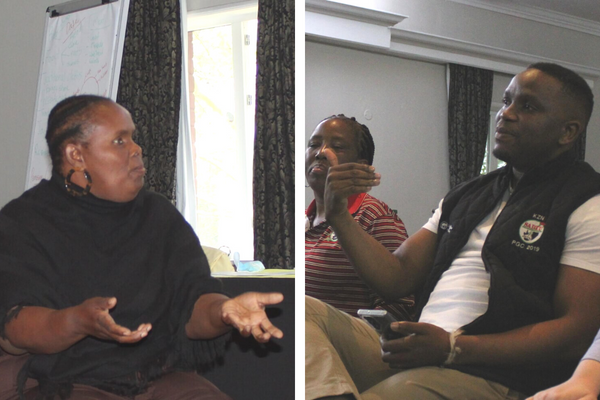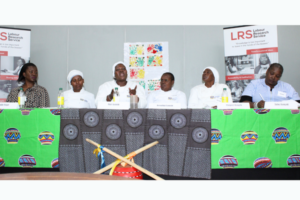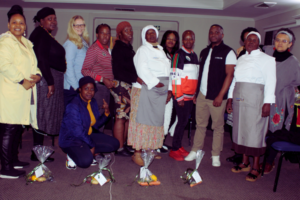Some of the most invisible workers in the economy are the about 60,000 volunteer food handlers employed in the National School Nutrition Programme (NSNP). In addition to these workers, many more workers in both formal and informal sectors experience job insecurity and violations of basic labour rights.
With the trends towards survivalist activities, self-employment, widespread informalisation and externalisation of employment, the invisibility of volunteer food handlers is reinforced. There is a growing layer of workers who appear to be in the formal economy, but to whom labour standards do not apply. Take the role of the volunteer food handler. It is in the NSNP of the Department of Basic Education, which is in the formal economy. Yet food handlers lack the rights and protections of formal employment.
In the changing work context, the trade union movement is struggling to organise and represent all workers. The Labour Research Service (LRS) supports trade unions in renewing their strategies to represent workers across the work continuum. Our learning spaces aim to link workers across the continuum to share their experiences and develop strategies to promote decent work.
Volunteer food handlers have appalling conditions at work, yet they rarely feature in trade union bargaining discourse. But unions have stepped up to try and gain a better understanding of the work conditions of food handlers. In 2022, LRS invited union activists to an exploratory dialogue about the NSNP, the critical role of healthy eating in children’s lives, and how they can highlight the value of volunteer food handlers – the workers, majority of them women, who cook and prepare the meals that feed millions of learners.
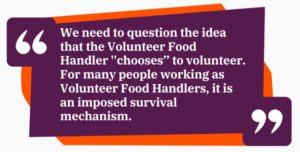
Conditions at work
Food handlers are classified as volunteers and paid a stipend of R1270.85 per month or R58.70 per day. This is well below the national minimum wage and the Extended Public Works Programme (EPWP) standard.
The LRS has gained a better understanding of the context in which food handlers work in the NSNP by hearing from current and former volunteer food handlers, community activists and leaders. These workers face myriad challenges, including poor treatment, inadequate safety, limited resources, long hours and lack of job stability (two-year contracts).
Nevertheless, food handlers recognise the importance of the NSNP and praise the contribution of the nutrition programme to improved learning outcomes in public schools.
Wage indicators
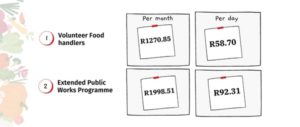
Volunteer food handlers recognise their essential role as parents, carers and food handlers in the school and community. However, food handlers do not feel valued and are frustrated by the treatment they receive from stakeholders in the nutrition programme. Key to this frustration is that their work is seen as voluntary rather than as formal employment. This means that food handlers do not have the rights of employees as stipulated in the Labour Relations Act (LRA).
Food handlers promote healthy eating. Hence, they are influencers of positive social change in their local communities.
What is it that makes the work of a food handler less respected? Is it because they are mothers?

Community dialogue on volunteer food handlers in the Vaal in 2022
We brought in all kinds of food and analysed it in comparison to the food served to the children in the NSNP. We did this because we often hear food handlers asking why there’s no sugar for cooking butternut, or why there’s no salt or packaged soups to go with the soya mince. We now know that excessive use of salt is not good. It harms blood pressure. The government is also aware of the importance of a healthy diet, which is why they have chosen the menu for the programme. So the exercise was for us to think about how we, as mothers and food handlers, can help the NSNP implement the existing menu and develop it according to the needs of different schools. We want to share what we have learnt and reflect further on our role in influencing nutrition in the school community and beyond in the communities in which we live. We want to practise what we preach.
Why should trade union activists contribute to making visible and valuing the work of volunteer food handlers?

LRS trade union dialogue on volunteer food handlers in Johannesburg in 2022
Trade unionists as educators
NSNP aims to improve learning, school attendance and punctuality, and generally contribute to the health and well-being of our learners. A child who receives a nutritious meal is more likely to be alert, responsive and eager to participate in the classroom. In the teaching and learning process, an active learner is key. Therefore, educators have a role to play in positively influencing the eating habits of learners, promoting nutritious menus, and the work of volunteer food handlers.
Trade unionists as parents
Many parents are unemployed or in low-paid jobs and struggle to feed their families. It is reassuring for parents to know that their child will receive a regular, balanced and nutritious meal through the NSNP. The NSNP also provides employment opportunities for some of the parents of learners. They can work as cooks or what is known as volunteer food handlers.
Trade unionists as community members
Everyone wants to see the children in their community thrive physically and intellectually. A balanced and nutritious meal is the key to a healthy mind and body. Community members should be actively involved in supporting a government initiative that focuses on the well-being of our children, while also having the potential to generate income for small groups of people in the community.
The LRS dialogue created a space for stakeholders to engage creatively in answering the question of what it takes to value the work of volunteer food handlers. In addition, the dialogue provided an opportunity for trade unions to work towards mutual learning and to gain a deeper understanding of the NSNP programme from a nutritional perspective while raising awareness of the role of volunteer food handlers.
Former food handlers and community activists spoke about how they felt the NSNP could improve the lives of school children, the wider community and food handlers. They recommended ways to improve. These included increased agency and decision-making power, access to a fair living wage, compensation for occupational hazards, protection of their rights as workers, increased respect and recognition of their contribution, and a review of the length of their contracts, among others.
The South African Democratic Teachers Union (SADTU) is concerned with the rights and welfare of all those working in education. SADTU was aware of the volunteer food handlers as a group of workers employed under the Extended Public Works Programme to perform food handling duties in the NSNP.
The union expressed its intention to support food handlers and suggested some strategies to facilitate this support. For example, they felt that the first step would be to approach the Education Labour Relations Council (ELRC) about this group of workers. SADTU also stressed the importance of a national survey and analysis of the working conditions of volunteer food handlers.
If we have to fight for the workers, but they are deliberately not seen as workers, then it makes it difficult for the trade unions to fight for them ~ SADTU negotiator
How trade unions can support volunteer food handlers
- Advocate for volunteer food handlers to be recognised as workers and to gain access to their constitutional right under Section 23(1) to “fair labour practices”.
- Build cross-sector alliances to assist food handlers to organise. Organised workers gain a collective voice to negotiate better conditions.
- Advocate for changes in the law to ensure that volunteer food handlers have better access to employment rights and protection.
A way forward
As SADTU, we don’t want to use the term ‘Volunteer Food handlers’. Instead, we want to call them School Chefs. ~ SADTU negotiator.
SADTU’s view is that the treatment of volunteer food handlers in the NSNP is purely exploitative:
“Ultimately, this is exploitation. If it isn’t, we want the DBE to prove it. The department needs to explain, for example, why it is imposing the conditions for workers on volunteers”.
SADTU pledged to seek more information and to take forward the process of supporting food handlers in lobbying for recognition.
At the end of the dialogue, the volunteer food handlers reclaimed their identity as school chefs. Now they feel inspired to continue their struggle for recognition, knowing that the unions, especially SADTU, will help them along the way.

“The department calls us volunteers. We call ourselves chefs. ” ~ Nomadlozi Gumede, Former volunteer food handler.
RESOURCE: Discussion Paper | Trade union dialogue on Volunteer Food Handlers

